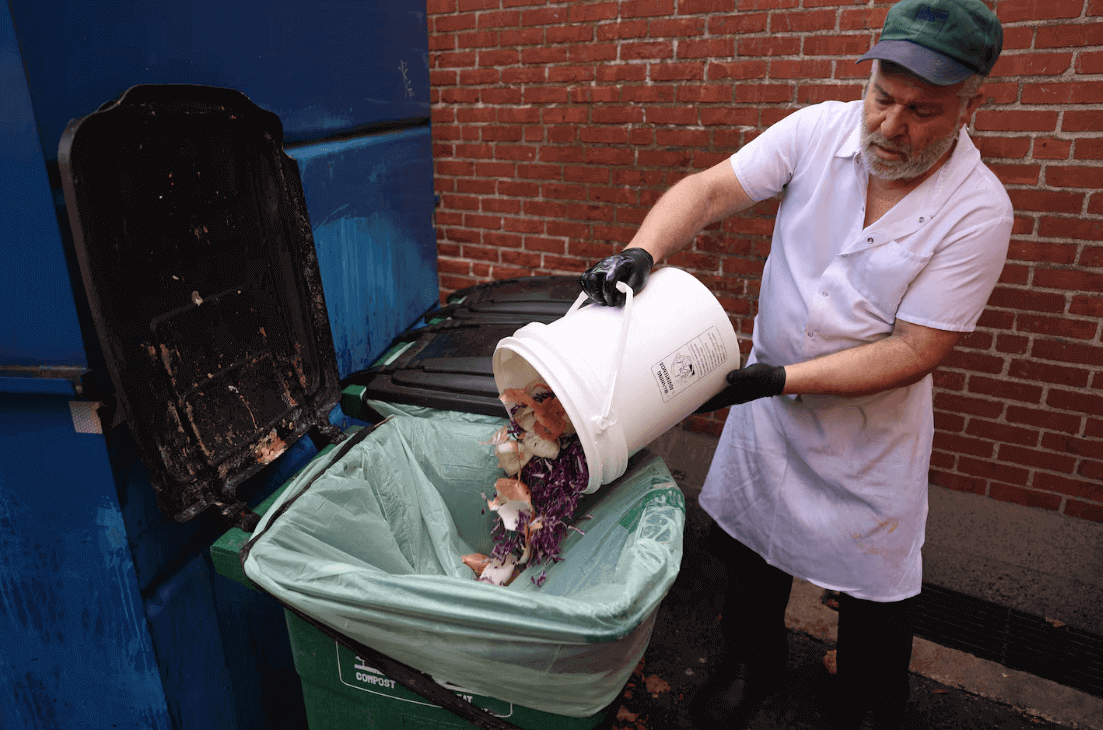马萨诸塞州是全美唯一一个大幅减少食物浪费的州,是怎么做到的?

【中美创新时报2024 年 12 月 2 日编译讯】(记者温友平编译)马萨诸塞州是近年来全美唯一一个大幅减少最终进入垃圾填埋场的食物垃圾量的州。“我们的研究结果表明,需要以马萨诸塞州为成功基准,重新评估食物浪费禁令,”研究人员在报告中写道。《波士顿环球报》记者Ivy Scott 对此作了下述详细报道。
Johnny’s Luncheonette 在最近的一个星期二的午餐时间人头攒动,源源不断的顾客进出梅子色的摊位,大快朵颐地吃着烙饼和三明治。在幕后,通过通往厨房的银色旋转门,餐厅工作人员正忙着将食物残渣与垃圾分开:金属黄油包装纸和小果酱包扔进垃圾桶,三明治的最后几口扔进三个 45 加仑的堆肥箱,餐厅每周都会把这些堆肥箱装满。
“这并不是说你做了什么不同的事情。他们不是把它扔进一个垃圾桶,而是把它扔进另一个垃圾桶,”餐厅联合老板凯·马斯特森说。“老实说,这比我想象的要容易,这很棒,因为并不是每个变化都是这样的。”
自从马萨诸塞州禁止每周产生超过 1,000 磅食物垃圾的企业将残渣扔进垃圾桶以来,牛顿餐厅是该州数百家企业之一——包括餐馆、杂货店、学校和酒店——重新考虑处理食物垃圾的方法。根据 9 月份发表在研究期刊《科学》上的一项研究,在所有禁止食物垃圾的州中,“仅马萨诸塞州就减少了垃圾填埋场垃圾”。
该禁令最初于十年前制定,随后于 2022 年扩大,旨在通过将至少 35% 的食物残渣从垃圾填埋场转移,降低该州的废物管理成本。研究人员将马萨诸塞州的成功归功于强大的基础设施和执法能力,并指出马萨诸塞州“每 1,000 平方英里的食物垃圾处理设施最多”,每年“检查次数是其他任何州的三倍多”。
像 Masterson 这样的餐馆老板在起步时得到了一些帮助。通过与当地非营利组织签订合同,该州的环境保护部为试图弄清楚如何减少食物浪费的企业提供免费援助。服务包括多语言标识,帮助厨房工作人员区分可堆肥物和垃圾,提供资金用于堆肥,与接收多余食物的施粥所和组织建立联系,以及与渴望接收不再适合人类食用的残羹剩饭的当地农场和堆肥运输商建立联系。
加州大学圣地亚哥分校和德克萨斯大学奥斯汀分校商学院的研究人员在报告中发现,虽然马萨诸塞州最终能够将垃圾填埋场的食物垃圾量减少约 10%,但研究中的其他四个州——加利福尼亚州、康涅狄格州、罗德岛州和佛蒙特州——尽管有垃圾禁令,却无法显著减少垃圾填埋场的食物。
马萨诸塞州迫切需要彻底改革其垃圾处理方式:马萨诸塞州已经将三分之一以上的垃圾运往国外,预计到 2030 年,该州的六个垃圾填埋场将满员。所有这些垃圾填埋场都会释放甲烷,这是一种加剧气候变化的强效温室气体。
美国环境保护署的研究报告称,美国垃圾填埋场每年的甲烷排放量占该国甲烷排放量的 14%,大致相当于 2400 多万辆汽油驱动汽车的排放量。另一方面,堆肥在食物分解时会使其充气,从而大大减少甲烷的释放量。报告称,全球食物垃圾占温室气体排放量的 8% 至 10%。
马萨诸塞州的关键是:大量的支持。
“为了让企业首先知道这些政策的存在,然后知道该怎么做,需要有人帮助他们,”CET(前身为生态技术中心)首席发展官 Lorenzo Macaluso 说,CET 是马萨诸塞州西部的一家非营利组织,与 RecyclingWorks 等州政府资助的项目签约,帮助企业减少浪费和能源消耗。
虽然一些企业主有堆肥和其他食物垃圾减少策略的经验,但其他组织才刚刚开始找出最适合他们的方法。
在福尔里弗,基督岩石神召会教堂的首席牧师 Rob Canavan 向一位垃圾减少顾问求助,以计算社区活动和教堂食品储藏室产生的食物残渣数量。RecyclingWorks 顾问 Sam Salvatore 赞扬了教堂目前的努力,即从当地杂货店和面包店向低收入或无家可归的居民提供多余的食物。在他们制定处理教堂剩余食物垃圾的计划时,她提出为教堂设计和打印定制标志,上面印有英语和葡萄牙语的堆肥和回收指南,这两种语言是他的工作人员使用的。
即使他的教堂没有达到每周 1,000 磅的上限,卡纳万说他仍然想尽量避免浪费任何食物。
“当我们有剩菜变质时,我们会把它们扔进垃圾箱,”他说。“如果有更好的解决方案,我们会这么做。”
迄今为止,CET 已向大约 16,000 家企业和组织提供了免费援助。在上一财年,该组织估计已将近 1,800 吨食物和其他材料从垃圾填埋场转移出去。
“当我们与这些企业交谈并帮助他们找到更好的解决方案时,我们立即处于一个非常值得信赖的空间,”Macaluso 说。
虽然食品垃圾禁令主要影响商业部门,但全州各城镇也推出了住宅堆肥计划和其他食品转移工作。
该州 351 个市镇中约有四分之一有投放或路边堆肥计划,要么由市政府运营(如波士顿),要么通过私人供应商运营。据公司数据显示,Black Earth 堆肥公司是该州最大的供应商之一,在近 30 个城市和城镇的约 40,000 个地点提供堆肥服务。然后,它将堆肥出售给新英格兰的居民。
对于有院子空间(并且喜欢园艺)的房主来说,后院堆肥也是一个选择。这是一种权衡——自己做比较便宜,但维护和翻堆需要时间。
另一个越来越受欢迎的想法是:从一开始就防止食物变质。波士顿食品正义办公室本周发布了第一份食品浪费评估报告,承诺开设一个冷藏设施来储存农产品和冷冻食品,并增加对从大学、医院和超市“拯救”过剩食品的团体的补助。
除了从私人住宅收集食品垃圾外,Black Earth 和其他堆肥运输商还与 Johnny’s 等企业合作。
Masterson 指出,特别是对于小型企业而言,在早期阶段提供量身定制的指导和资金支持对于减少食品浪费至关重要。对于那些负担不起或不愿支付堆肥收集费用的企业(Masterson 每年的费用略低于 3,000 美元,她说,随着食品基准成本不断上涨,这对小型企业来说可能是一笔“非常痛苦”的额外费用),CET 最近启动了一项资助计划,免费为小型企业提供最初几个月的堆肥服务。
在北亚当斯,Door Prize 餐饮公司的共同所有人 Bryan Josephs 表示,资金对于帮助他在备餐厨房开始堆肥是必不可少的。
“即使你取消几个月的财务障碍,也会让企业主对堆肥更有吸引力,并将其放在他们的待办事项清单的首位,而不是最后一位,”他说,并补充道,“我们肯定会在之后继续堆肥。”
CET 的 Macaluso 指出,该集团最近在康涅狄格州、罗德岛州和纽约州签订的合同表明,减少食物浪费的量身定制的胡萝卜加大棒方法是可行的,其他禁止食物浪费的州正在向马萨诸塞州学习。
“他们认识到这是缺失的一个重要因素,”他说,“并且正在进行投资……以确保他们的政策取得成功。”
题图:Jose Freitas 在牛顿的 Johnny’s Luncheonette 清理堆肥。马萨诸塞州是近年来全美唯一一个大幅减少最终进入垃圾填埋场的食物垃圾量的州。Jessica Rinaldi/Globe 员工
附原英文报道:
Mass. is the only state in the nation to significantly cut food waste. How did we do it?
“Our findings reveal the need to reassess food waste bans using Massachusetts as a benchmark for success,” researchers wrote in their report.
By Ivy Scott Globe Staff,Updated December 2, 2024
Jose Freitas took out the compost at Johnny’s Luncheonette in Newton. Massachusetts is the only state in nation to significantly reduce the amount of food waste that ends up in landfills in recent years.Jessica Rinaldi/Globe Staff
NEWTON — Johnny’s Luncheonette was bustling at lunchtime on a recent Tuesday, with a steady flow of customers sliding in and out of plum-colored booths and digging into flapjacks and sandwiches. Behind the scenes, through a swinging silver door that led to the kitchen, diner staff were busy separating food scraps from the trash: metallic butter wrappers and tiny jam packets into the garbage, the last bites of sandwiches into three 45-gallon compost bins the restaurant fills to the brim each week.
“It’s not like you’re doing anything that different. Instead of tossing it into one bin, they’re just tossing it into another,” said restaurant co-owner Kay Masterson. “Honestly, it was easier than I thought it was gonna be, which is wonderful because not every change is like that.”
The Newton diner is one of hundreds of businesses around the state — including restaurants, grocery stores, schools, and hotels — to rethink the approach to food waste in the two years since Massachusetts banned businesses that generate more than 1,000 pounds of food waste a week from tossing those scraps in the garbage. And of all states with food waste bans, “Massachusetts alone has reduced landfill waste,” according to a study published in September in the research journal Science.
The ban, first created a decade ago and then expanded in 2022, sets the goal of reducing the state’s waste management costs by diverting at least 35 percent of all food scraps from landfills. Researchers attributed the Bay State’s success to strong infrastructure and enforcement, noting that Massachusetts has “the most food waste processing facilities per every 1,000 square miles” and “more than triple the number of inspections” per year than any other state.
Restaurant owners such as Masterson have some help getting started. Through contracts with a local nonprofit, the state’s Department of Environmental Protection provides free assistance to businesses trying to figure out how to cut down their food waste. Services include multilingual signs to help kitchen staff distinguish between compostables and trash, funding to pay for composting, and connections to soup kitchens and organizations that take excess food, as well as to local farms and compost haulers eager to take scraps no longer fit for humans to eat.
The researchers from business schools at the University of California San Diego and the University of Texas at Austin found in their report that while Massachusetts was ultimately able to decrease the amount of food waste in landfills by around 10 percent, four other states in the study — California, Connecticut, Rhode Island, and Vermont — were unable to significantly reduce food in landfills despite waste bans.
The need to overhaul how Massachusetts addresses its waste is urgent: the Bay State already exports more than a third of its trash, and the state’s six landfills are expected to fill by 2030. All those landfills release methane, a potent greenhouse gas that fuels climate change.
Research from the Environmental Protection Agency reports that US landfills account for 14 percent of the country’s methane emissions annually, roughly equal to driving more than 24 million gasoline-powered cars. Composting, on the other hand, aerates food as it decomposes, significantly reducing the amount of methane released. Global food waste contributes 8 to 10 percent of greenhouse gas emissions, according to the report.
The key in Massachusetts: lots of support.
“In order for businesses to even know that these policies exist in the first place and then know what to do about it, somebody needs to help them,” said Lorenzo Macaluso, chief growth officer for CET (formerly known as the Center for EcoTechnology), a nonprofit in Western Massachusetts that contracts with state-funded programs like RecyclingWorks to help businesses reduce their waste and energy consumption.
While some business owners have experience with composting and other food waste reduction strategies, other organizations are just starting to figure out the approach that works best for them.
In Fall River, Rob Canavan, lead pastor of Christ the Rock Assembly of God Church, turned to a waste reduction consultant to calculate the amount of food scraps generated through community events and the church’s food pantry. Sam Salvatore, the RecyclingWorks consultant, commended the church’s existing efforts to provide excess food from local grocery stores and bakeries to low-income or homeless residents. As they devised a plan to handle the church’s remaining food waste, she offered to design and print custom signs with composting and recycling guidelines for the church in English and Portuguese, the languages spoken by his staff.
Even if his church doesn’t hit the 1,000-pound-a-week limit, Canavan said he’d still like to avoid wasting any food he can.
“When we have leftovers and they go bad, we throw them in the dumpster,” he said. “If there’s a better solution, we want to do that.”
CET has provided no-cost assistance to roughly 16,000 businesses and organizations to date. During the last fiscal year, the organization estimates it diverted nearly 1,800 tons of food and other materials from landfills.
“We’re immediately in a very trusted space when we’re talking to those businesses and helping them navigate their way to better solutions,” said Macaluso.
While the food waste ban primarily affects the commercial sector, cities and towns across the state have also launched residential composting programs and other food diversion efforts.
Roughly a quarter of the state’s 351 municipalities have either drop-off or curbside composting programs, either run by the city — as in Boston — or through a private vendor. Black Earth compost, one of the largest vendors in the state, provides composting in nearly three dozen cities and towns at roughly 40,000 locations, according to company data. It then sells the compost to residents in New England.
For homeowners with the yard space (and a penchant for gardening), backyard composting is also an option. It’s a tradeoff — cheaper to do on your own, but it takes time to maintain and turn the compost.
Another idea gaining traction: Keep food from going bad in the first place. Boston’s Office of Food Justice released its first food waste assessment this week, pledging to open a refrigeration facility to store produce and frozen foods, as well as increase grants to groups that “rescue” excess food from universities, hospitals, and supermarkets.
In addition to picking up food waste from private homes, Black Earth and other composting haulers also work with businesses like Johnny’s.
Masterson noted that especially for small businesses, having tailored guidance and financial support in the early stages is critical to slashing food waste. And for businesses that can’t afford or balk at the price of compost pickup (it costs Masterson just shy of $3,000 a year, which she said can be a “very painful” added expense for small businesses as baseline costs for food continue to rise), CET recently launched a funding program to provide the first few months of composting to small businesses for free.
In North Adams, Door Prize catering co-owner Bryan Josephs said funding was indispensable to helping him start composting at his prep kitchen.
“Even if you withdraw the financial barrier for a few months, it makes it so much more attractive to business owners, and just puts it on the top of their to-do lists as opposed to the bottom,” he said, adding, “we’ll keep composting after this for sure.”
Macaluso, of CET, pointed to the group’s recent contracts in Connecticut, Rhode Island, and New York, as evidence that a tailored, carrot-and-stick approach to reducing food waste is the way to go, and that other states with food waste bans are learning from Massachusetts.
“They are recognizing that this is an important missing ingredient,” he said, “and are making that investment … to make their policy a success.”

